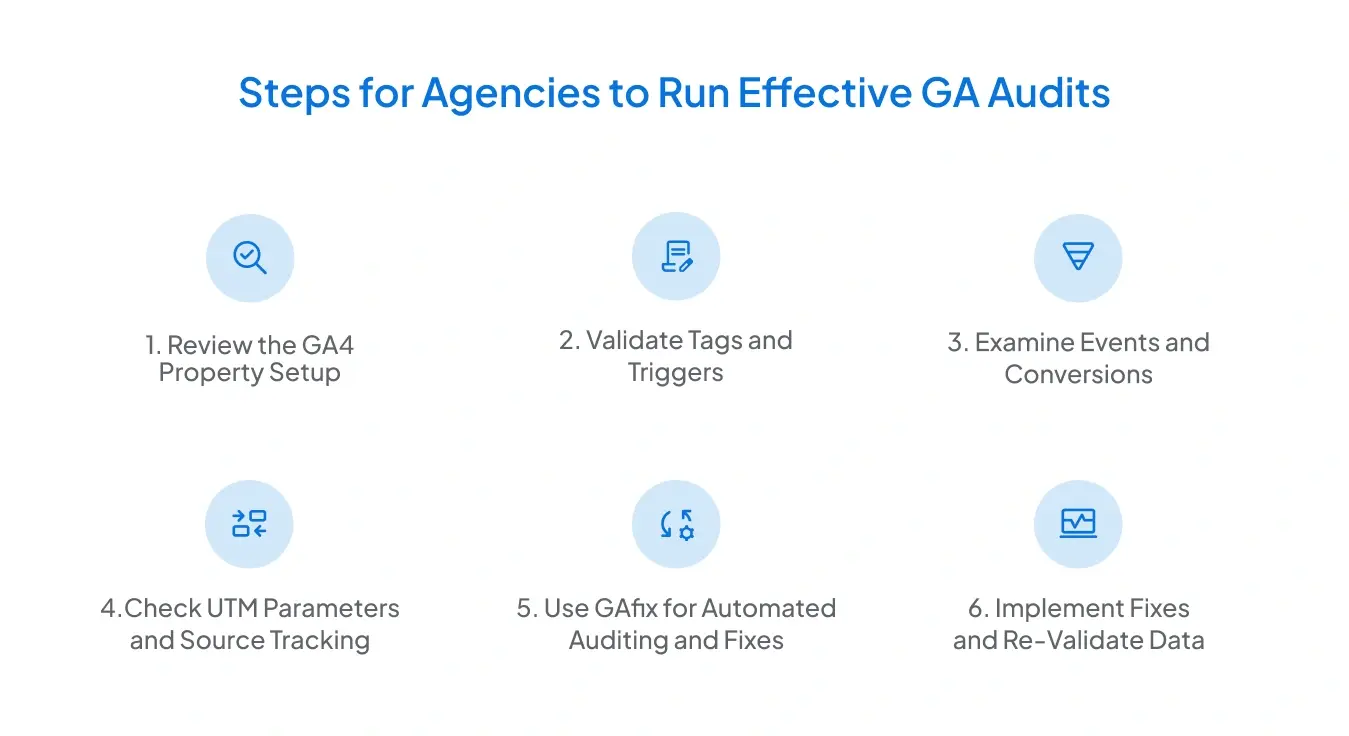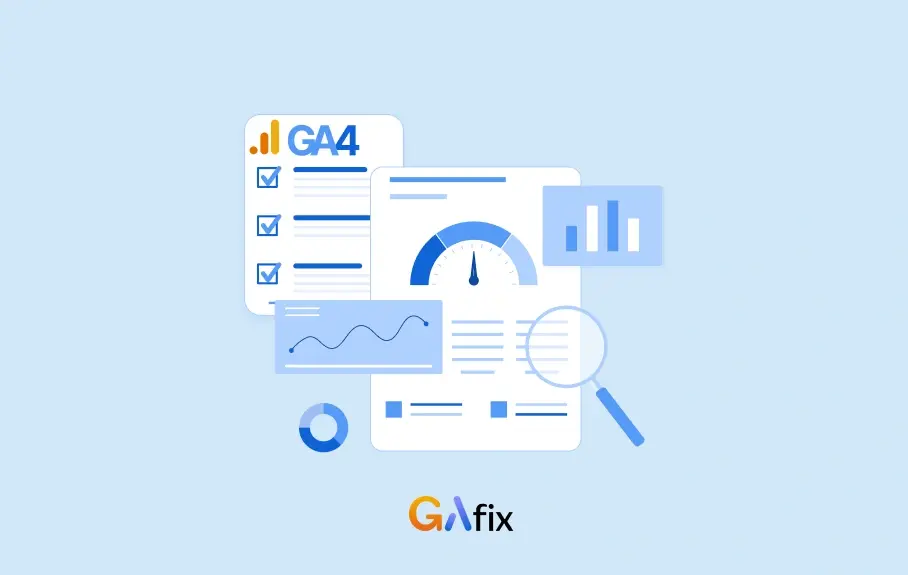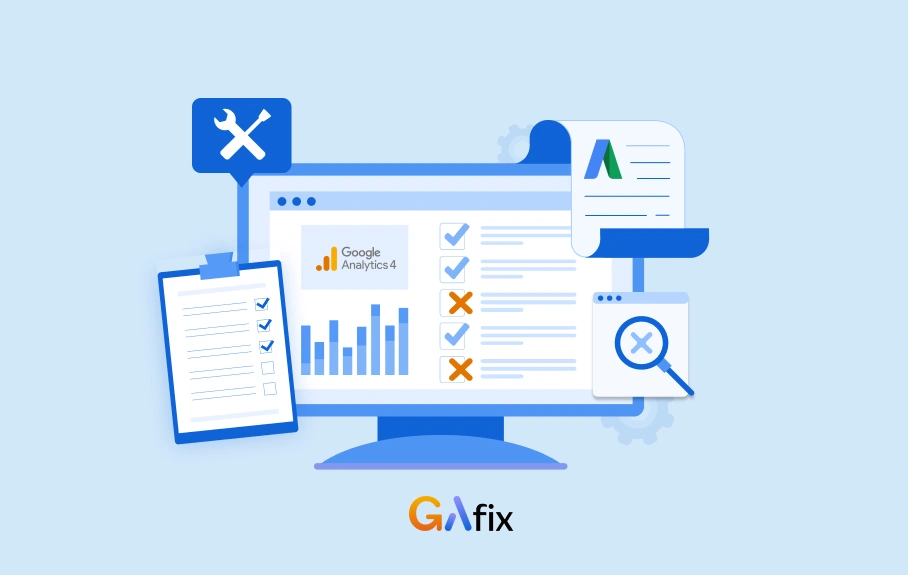
Agencies often spend hours verifying campaign data before compiling performance reports. Inconsistent tracking, missing events, or incorrect GA4 configurations can delay insights and make reporting less reliable. A Google Analytics (GA) audit helps identify these issues early, ensuring the data used for analysis is accurate and complete.
According to the Gartner 2025 CMO Spend Survey, marketing budgets remain flat at just 7.7% of overall company revenue, prompting many agencies to shift their focus toward improving analytics efficiency and campaign reporting workflows. By running regular GA audits, agencies can avoid repetitive data checks, automate quality reviews, and speed up how quickly reports are delivered to clients. Automated tools like GAfix now make this process much faster by scanning your GA4 setup, detecting configuration issues, and providing instant recommendations, allowing teams to focus more on strategy than troubleshooting.
What Is a GA Audit and Why Does it Matter for Agencies?
A Google Analytics audit is a detailed review of your tracking setup that helps verify if data is being collected correctly. For agencies managing multiple clients, it acts as a checkpoint to ensure that every event, conversion, and UTM parameter aligns with campaign goals. Without such audits, data discrepancies can easily go unnoticed, leading to unreliable reporting and missed insights.
A well-executed GA audit allows agencies to:
- Identify tracking errors: Detect missing tags, duplicate events, and incorrect property settings.
- Validate key metrics: Ensure conversions, sessions, and user engagement data reflect real activity.
- Maintain consistency across accounts: Standardize tracking methods across different client campaigns.
- Improve data reliability: Build confidence in reports shared with clients and stakeholders.
By making audits a regular part of campaign operations, agencies can maintain accurate analytics foundations. This ensures the insights drawn from GA4 dashboards are based on clean, verified data, ultimately leading to quicker and more credible campaign reporting.
Common Reporting Challenges Agencies Face Without GA Audits

Many agencies face reporting delays not because of poor strategy, but due to inconsistent or incomplete analytics data. When tracking configurations are overlooked, small data gaps can multiply across multiple client accounts. These gaps often result in inaccurate metrics, longer verification times, and lower client confidence in campaign results.
Some of the most common reporting challenges include:
- Incomplete event tracking: Missing or misfired events make it difficult to measure actual campaign performance.
- Incorrect tag setup: Errors in Google Tag Manager or GA4 properties lead to missing conversions and skewed data.
- Inconsistent UTM usage: Poorly structured campaign URLs can cause fragmented data across reports.
- Manual data validation: Analysts spend extra hours reconciling mismatched metrics between Google Analytics 4 (GA4) and ad platforms.
- Reporting delays: Inaccurate or unverified data slows down the delivery of weekly or monthly reports to clients.
Without a structured audit process, these issues often repeat with every new campaign cycle. Regular GA audits help agencies identify and address such gaps early, ensuring that reporting remains both timely and reliable.
How GA Audits Streamline Campaign Reporting?
GA audits help agencies turn scattered, unreliable analytics into clean, actionable data. When audits are performed regularly, they prevent recurring issues like duplicate tags, untracked events, or incomplete conversion data. This ensures that all campaign metrics flow correctly into reports, reducing the time spent on manual data validation.
By maintaining a consistent audit process, agencies can detect discrepancies before they impact client deliverables. It also helps create a standardized data structure across all accounts, making it easier to compile cross-channel reports. Instead of investigating missing metrics at the end of each campaign, teams can rely on audit-backed data that’s already verified and ready for visualization.
Automated tools like GAfix further improve this workflow by running complete GA4 audits in minutes. They identify tracking errors, configuration gaps, and event mismatches, areas that typically take hours to uncover manually. With these insights available instantly, analysts can focus more on building strategic narratives from the data rather than fixing its foundation.
Steps for Agencies to Run Effective GA Audits

Running effective GA audits requires a structured process that helps agencies maintain accurate and consistent data across all client accounts. Instead of treating it as a one-time task, agencies should integrate audits into their campaign workflow to catch issues early, streamline reporting, and reduce rework later.
Here’s how agencies can conduct an efficient GA audit:
1. Review the GA4 Property Setup
Begin by checking the property configuration for each client. Confirm that the right data streams are connected, event parameters are tracking correctly, and data filters or exclusions aren’t affecting important metrics.
2. Validate Tags and Triggers
Use Google Tag Manager (GTM) to verify that all tags are firing properly. Check for duplicate or outdated tags, incorrect trigger conditions, and event mismatches. This helps prevent data loss and ensures each campaign activity is being tracked accurately.
3. Examine Events and Conversions
Review the list of key events and confirm that conversions align with client goals whether that’s form submissions, sign-ups, or purchases. Incorrect naming conventions or missing event parameters can lead to incomplete reporting, so this step ensures accuracy before data reaches dashboards.
4. Check UTM Parameters and Source Tracking
Ensure consistent UTM structures across platforms. Inconsistent tagging causes fragmented traffic data and makes it harder to attribute campaign results. A standardized format for all links avoids this issue.
5. Use GAfix for Automated Auditing and Fixes
After manual checks, use GAfix.ai to automate the deeper technical audit. GAfix scans your GA4 setup within minutes and identifies common misconfigurations such as missing events, incorrect tag setups, or data discrepancies that are often overlooked during manual reviews.
Once the audit is complete, it generates a detailed report with clear, actionable recommendations. These insights guide teams on exactly what to fix, reducing dependency on advanced technical expertise.
For agencies managing multiple clients, this automation saves hours of manual review time and ensures every report is built on reliable, verified data. Since GAfix works with read-only access, it maintains data security while allowing users to interpret results confidently.
6. Implement Fixes and Re-Validate Data
Apply the recommended fixes based on audit findings and test each update using GA4 DebugView or GTM preview. Once done, re-run the audit either manually or through GAfix to ensure all previous issues are resolved and data accuracy has been restored.
By combining structured manual checks with automated auditing tools like GAfix, agencies can eliminate tracking inconsistencies, shorten validation cycles, and generate client reports faster. This hybrid approach ensures analytics data remains clean, consistent, and ready for reporting at any time.
Integrating GA Audits with Campaign Reporting Tools
Once agencies have completed their GA audits, the next step is to connect this verified data with reporting and visualization tools. Clean, accurate analytics data ensures that every campaign metric presented to clients reflects true performance. When audit-verified data flows into reporting systems, it eliminates inconsistencies and reduces the need for manual corrections later.
Agencies can integrate GA4 data into tools like Looker Studio, Power BI, or Tableau to create automated dashboards. These dashboards pull real-time metrics directly from GA4 properties, providing campaign teams with updated insights at any time. However, the accuracy of these dashboards depends entirely on the quality of the data feeding them, making regular GA audits essential to maintain trust and transparency in client reports.
By pairing GA audits with automated platforms, agencies can establish a continuous data validation cycle. Tools like GAfix can support this process by exporting audit reports or summaries that highlight configuration issues before the data reaches reporting dashboards. This helps agencies ensure their dashboards always display verified, reliable metrics without last-minute manual checks.
Conclusion
Running regular GA audits is essential for agencies aiming to maintain clean, reliable, and actionable marketing data. A well-structured audit process helps uncover hidden tracking errors, improve attribution accuracy, and strengthen overall campaign reporting. For teams looking to simplify and speed up this process, tools like GAfix can make a real difference by automating audits, detecting issues within minutes, and offering clear fixes that help analysts stay focused on strategy rather than troubleshooting.

Frequently Asked Questions
Why should agencies run regular GA4 audits?
Regular GA4 audits help agencies maintain clean, reliable tracking data. They detect issues such as missing tags, duplicate events, and incorrect configurations that can impact the accuracy of client reports and campaign insights.
How does GAfix simplify the GA4 audit process?
GAfix automates the entire GA4 audit workflow, scanning accounts for errors, generating actionable recommendations, and helping teams resolve tracking issues in minutes. This saves time and ensures consistent data accuracy for better reporting.
How often should agencies perform GA audits?
It’s best to conduct GA audits quarterly or whenever new campaigns, tracking codes, or integrations are added. Regular checks ensure data integrity and prevent reporting discrepancies before they impact performance analysis.
Confident Decisions Start with Accurate Analytics
Ensure your GA4 is correctly configured, reliable, and ready for scale.











.webp)






